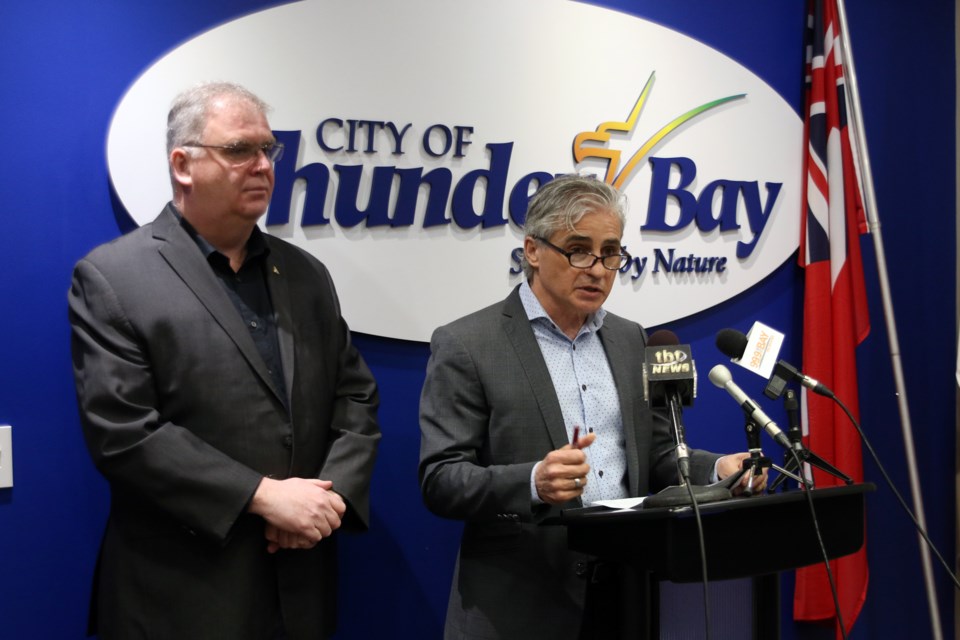THUNDER BAY – Rumoured provincial support remains unconfirmed more than a month after the City of Thunder Bay declared a state of emergency and issued a request for aid to confront a COVID-19 outbreak among its vulnerable population.
The outbreak has strained hospital capacity and the resources of local shelters, health agencies, and social services.
Mayor Bill Mauro said Monday he expected the province to provide staffing support of between 10 and 20 people via Ontario Health for the COVID-19 isolation shelter operated by a collection of local organizations.
The province could not confirm if it would provide any direct aid in response to the declaration as of Saturday, though it has facilitated assistance from non-governmental organizations including the Canadian Red Cross.
The number of people using the isolation shelter rose above 100 this week, after sitting closer to 10 or 15 through most of the pandemic, as the city grappled with record active case numbers and COVID-related hospitalizations.
The Thunder Bay District has the most COVID-19 cases per capita of any health unit in the province in recent data, with the number of active cases approaching 400 in recent days.
The isolation shelter, housed at two local hotels, provides rooms, food, and access to supports for those without a safe place to self-isolate after they test positive, report symptoms, or are exposed to COVID-19.
City manager Norm Gale formally requested assistance from the province on Feb. 2 following Mauro's declaration of emergency the same day, saying local agencies required more funding and staff to confront the crisis.
The Thunder Bay District Health Unit declared a COVID-19 outbreak among the city's homeless and precariously housed population the next week.
The province convened a meeting Feb. 2 through the Provincial Emergency Operations Centre (PEOC), Gale reported, and has held several meetings since with the city. He could not confirm any aid had been received, and directed questions over staff supports to the St. Joseph’s Care Group, which helps staff the isolation shelter.
The emergency operations centre was crucial in securing aid from several NGOs, said SJCG president Tracy Buckler.
However, the province itself has not yet confirmed any new funding or staffing support in response to the emergency declaration.
The shelter operates 24/7 and is now being staffed by up to 48 people a day from various local organizations, said Buckler.
Agencies like NorWest Community Health Centres provide access to harm reduction and health services on site, including a managed alcohol support, opioid agonist treatment, tobacco, and prescription medication, the city recently reported.
Local groups are struggling to meet the growing needs at the shelter, Buckler said.
“We saw a real surge in demand,” she said. “We had to expand our capacity very quickly, and there are simply not enough human resources to be able to manage that.”
About 15 to 20 volunteers from NGOs including Samaritan’s Purse and Team Rubicon, including some health care professionals, are lending a hand. The Red Cross provided assistance but has since departed.
“With the staff that came in through the various organizations, we’re certainly breathing a sigh of relief," Buckler said. "My team at St. Joseph’s Care Group has been working flat out. They needed some help and support.”
Buckler was uncertain how long that help would last, however, while she expects the shelter will be in operation for several more months. St. Jo's has already begun hiring additional nursing staff, hopeful the province will reimburse the expense.
“We don’t have a confirmation on that, but we know that we needed to get some help,” Buckler said. “We’ve gone ahead and contracted with the nursing agency, and we have a pretty high level of confidence the province will cover the COVID expenses.”
“These are not frivolous expenses, these are required supports for people in our community, and I have no reason to think they won’t be covered.”
Questioned by Tbnewswatch about the province's response to the city's request for aid, a spokesperson for the Ministry of Municipal Affairs and Housing pointed to funding that was provided to all cities and social service agencies in Ontario.
The Thunder Bay District Social Services Board (DSSAB) has received $4.84 million from the federal-provincial Social Services Relief Fund (SSRF) since the pandemic began, they indicated.
Ontario Health North has also committed around $166,000 to support the isolation shelter, the government said, but could not confirm if that money was previously allocated or in response to the declaration of emergency.
Hotel expenses at the shelter have so far been covered by the DSSAB with SSRF dollars, while the DSSAB is working with local organizations to provide meals. It has also committed five staff to support the shelter from its existing budget.
CAO Bill Bradica estimated the agency has spent north of $800,000 supporting the isolation shelter since it was launched in April 2020.
However, the provincial funding it has relied on to cover those costs will expire on March 31. The province has not yet announced whether it will renew the fund, Bradica said.
Organizations managing the isolation shelter have also applied to the federal Public Health Agency of Canada to fund it from April through September. No announcement has yet been made on the application.
Health Minister and Thunder Bay-Superior North MP Patty Hajdu called it a "very solid proposal" earlier this week, saying she expected good news on the file, but noting she was not directly involved in the application.
